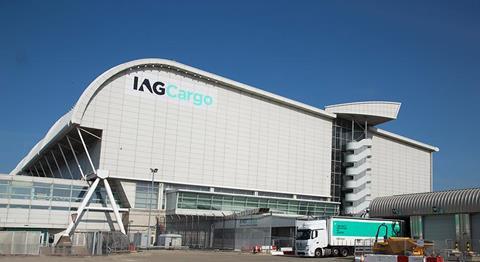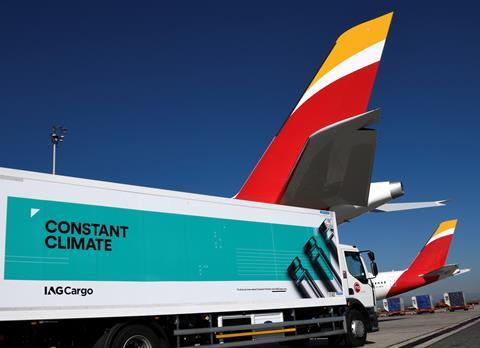IAG Cargo is investing in facilities, digitalisation and people as it looks to keep ahead of emerging trends and developments in air cargo.
One of the biggest non-flying investments that the IAG Group has ever made in the UK is the IAG Cargo Centre at London Heathrow Airport.
That is proof, if any were needed, that IAG - comprising British Airways, Iberia, Vueling, Aer Lingus and Level - takes its cargo business very seriously, says its chief executive, David Shepherd.
The airfreight business has gained a much higher profile in recent years, especially with its role in delivering PPE and then vaccines during the Covid pandemic, but as far as Shepherd is concerned, the IAG Group is no recent convert to the cargo cause. “They’ve always been very open to developing its cargo business and have always fully understood its value to the business.”
Shepherd’s own journey to the helm of IAG Cargo began in the seaside town of Bangor, Northern Ireland. His father was one of the top travel agents in Northern Ireland and working for an international airline had a certain appeal to the young Shepherd.
He had a plan worked out: “I gained a sponsorship to British Airways’ engineering division in 1990 and went to Brunel University.”
However, he actually joined BA’s accountancy department, having gained the relevant qualification. “In those days, the BA board consisted mostly of accountants and lawyers, so I thought that my chances of advancement would be greatly improved if I joined that side of the business.”
His choice of employer has been vindicated and his career has taken him all over the world; his children were born in South Africa and Germany. However, he retains his strong links in Northern Ireland and returns there whenever he can.
Following Shepherd’s early days at BA, he made a move to the cargo department in 2000 and became general manager for Africa, based first in London and then in Johannesburg. “That was an amazing job. It taught me such a lot about the business.”
There then followed a spell in Frankfurt, running BA’s European cargo arm and then “a brilliant five years” in New York.
Why cargo? “I think it was because I’ve always enjoyed applying my management skills and cargo gave the opportunity to apply for and get jobs almost beyond your wildest dreams.”
Apart from a two-year spell as chief commercial officer of IAG’s Aer Lingus arm in Ireland, he has been in cargo almost all his career.
IAG’s cargo focus
British Airways of course became part of the IAG Group of airlines in 2011, which has brought other important cargo businesses to the group, not least of them Iberia with its Latin America business hubbed in Spain.
Cargo has the reputation of being something of a hidden aspect of the air industry and it is a fact that passengers will generate the lion’s share of the revenue at most combination carriers.
However, as Shepherd says, there has never been any doubt at IAG of the importance of cargo, both from a financial and even a societal point of view.
“I can only speak for IAG, but this airline group has always been very open to developing its cargo business. Yes, passengers are the principal source of revenue, but the cargo business is highly valued here,” he says.
That value goes beyond mere money, though. “Cargo is important to society too. For instance, the delivery of PPE and vaccines during the pandemic couldn’t have happened without it.”
IAG’s investment in its cargo business is a continuous process. Much of it is not always immediately apparent. As well as the aforementioned Heathrow cargo centre, existing facilities need to be refurbished and improved after a life of a quarter of a century.

Equally: “There is a lot of new technology. For example, we have been working with a partner, Cind, that will allow us to dimension-check shipments and so massively improve the efficiency of our pallet-building. And later this year we will invest in analytic platforms that will not only allow us to make better use of resources, but also improve safety around the airport. It’s a lot more than bricks and mortar.”
The industry is on the threshold of very exciting times, Shepherd believes. “For example, Artificial Intelligence could take the manual, laborious part of the work out of the freight quotation process – and that in turn could make it easier to attract people into those jobs that have been traditionally hard to fill.”
He is also glad that the air cargo industry is at last beginning to take digitisation more seriously with efforts to cut out excessive paperwork starting to take effect. “IATA’s One Record campaign is very important and it’s good to see so many people getting on board.”
Yes, the road to airfreight digitisation has been long and winding, and there have been times when it seemed that no progress at all was being made, but these efforts by many people are being rewarded.
“I think as an industry it has been hard to get everyone to invest and sign up to different things and some people are more to the fore than others. But it seems to me that there has been a move forward,” Shepherd says.
Handling complexity
Airfreight is a complex industry with, as well as carriers, entities like freight forwarders, handlers, trucking companies all involved and until everyone is singing from the same electronic song sheet, progress towards digitisation will be somewhat halting.

However, there has lately been progress with e-bookings, eAWBs and electronic quotations.
Even more important than computers and systems are IAG Cargo’s people. Recruiting new entrants into the industry is important, but does air cargo always project the right image to outsiders?
It is in fact a much more exciting world than many people realise. As Shepherd himself found: “There is actually a huge variety of work in this sector, anything from accounting to application of technology, and then again there are all the societal benefits that air cargo brings.”
He is responsible for a workforce of 2,500 globally, around 1,500-1,600 of them at Heathrow, 400 in Madrid, 200 in Dublin and the rest at different stations around the world.
Those are just the direct jobs – there are many more people who work for the different general sales agents that represent IAG Cargo both in the UK and abroad, at ground handlers and all the many components that make IAG Cargo tick.
Indeed: “One of the many attractions of this job to me is the global nature. No day is the same.”
The creation of IAG Cargo from BA, Iberia and all the other airlines that make up the group has no doubt made for an even more complex organisation but Shepherd has no regrets on that score.
Some 13 years on since IAG Cargo was created, the growth and opportunities that it has created has more than outweighed the complexity of bringing the different cargo entities together.
Iberia, for example, offers unique access to the Latin American market and IAG is probably the biggest carrier between Asia Pacific and Latin America, hubbed via London and Madrid.
Of course, being in charge of such a large and widespread cargo operation of a major international group of carriers does bring unique pressures, but Shepherd stresses that the most important thing never to lose sight of is that: “My first responsibility is to ensure that everything is safe and secure. Beyond that, I have direct responsibility for the livelihoods of 2,500 people, and more at our many partners and then, thirdly, I need to make a financial return for the IAG Group.”
“And I think that everyone at any airline would say pretty much the same thing,” he concludes.
https://www.aircargonews.net/sectors/perishable-logistics/iag-cargo-expands-constant-climate-network-in-europe/















